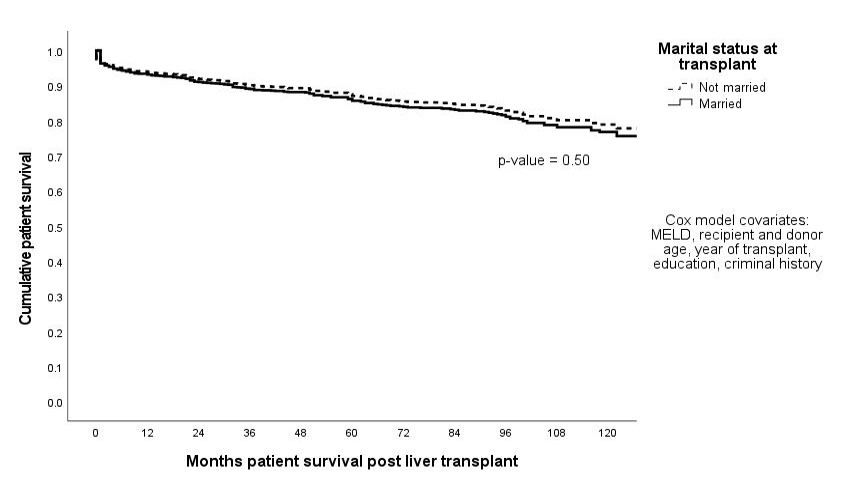Liver Transplant Recipient Social Support Network: Impact on Clinical Outcomes
1Social Work, Indiana University, Indianapolis, IN, 2Surgery, Indiana University, Indianapolis, IN, 3Department of Surgery, Indiana University, Indianapolis, IN, 4Department of Surgery, Indiana University Hospital, Indianapolis, IN, 5Surgery, Indiana University - Transplant Surgery, Indianapolis, IN, 6Department of Surgery, Indiana Univ School of Medicine, Indianapolis, IN, 7Indiana University School of Medicine, Indianapolis, IN, 8Department of Surgery, Indiana University, Fishers, IN
Meeting: 2022 American Transplant Congress
Abstract number: 871
Keywords: Liver transplantation, Outcome, Screening
Topic: Clinical Science » Liver » 55 - Liver: Recipient Selection
Session Information
Session Time: 5:30pm-7:00pm
 Presentation Time: 5:30pm-7:00pm
Presentation Time: 5:30pm-7:00pm
Location: Hynes Halls C & D
*Purpose: Health disparities are present in transplantation, just as in other areas of medicine. This is a retrospective review of liver transplant (LT) recipients to determine the impact of social support networks on early liver transplant outcomes and 10-year survival.
*Methods: The records of consecutive LT patients at a single center were reviewed (2010-2020). Bivariate and subgroup analysis explored social support network differences in demographic and psychosocial factors. Cox regression was used to estimate survival.
*Results: There were 1297 subjects, the subject support networks included any immediate family support 1227 (95%), any extended family support 650 (50%), and any non-family support 389 (30%). Of the overall population 857 were married (66%), 228 were divorced (18%), 154 were single (12%), 45 were widowed (4%). Subjects with any immediate family support were more likely to be employed at time of LT (p<0.01). Black subjects are less likely to have any immediate family support (p<0.001). Females were more likely to have any extended family support (p=0.01). Subjects with a history of mental illness were more likely to have immediate family support (p=0.01). Subjects with any immediate family support were more likely to have any illicit drug history (p<0.001). For clinical outcomes, there was no difference in wait time to transplant, 90-day mortality, length of hospital stay, or 1-year survival among the social support network groups. Cox 10-year patient survival found no significant differences in marital status when controlling for MELD, recipient and donor age, year of transplant, recipient criminal history and education.
*Conclusions: This study contains detailed demographic and psychosocial information of a large number of LT recipients. These results suggest similar post-LT outcomes when stratified by social support networks, though there were differences in the psychosocial make-up of the study groups. Likely, the Cox regression analysis controlled for these factors by including a history of criminality and education which are commonly identified markers for these disparities.
To cite this abstract in AMA style:
French MM, Mangus RS, Holmes R, Krause A, Sumner J, Kubal C, Ekser B, Mihaylov P, Fridell J, Lutz A. Liver Transplant Recipient Social Support Network: Impact on Clinical Outcomes [abstract]. Am J Transplant. 2022; 22 (suppl 3). https://atcmeetingabstracts.com/abstract/liver-transplant-recipient-social-support-network-impact-on-clinical-outcomes/. Accessed February 9, 2026.« Back to 2022 American Transplant Congress

